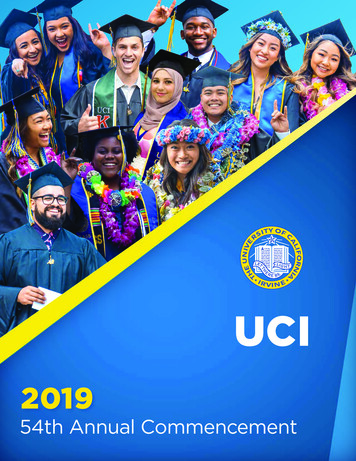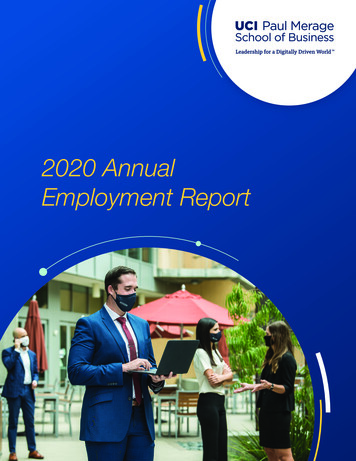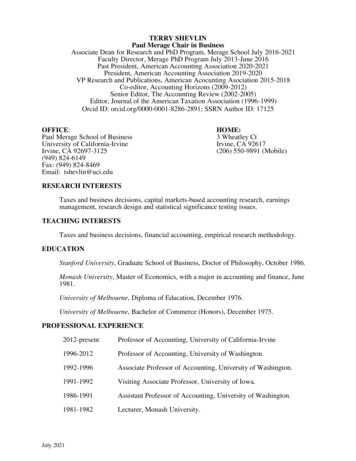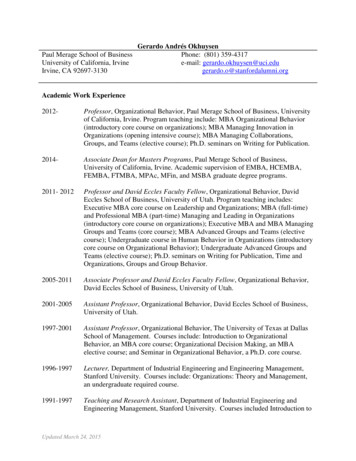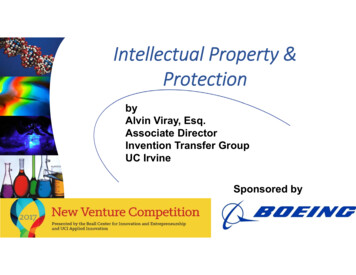
Transcription
The Paul Merage School of Business1The Paul Merage School of BusinessIan Williamson, DeanThe Paul Merage School of Business (http://merage.uci.edu/) offers the B.A. in Business Administration, the B.S. in Business Information Management(offered jointly with the Donald Bren School of Information and Computer Sciences), the M.B.A. (Master of Business Administration), the MPAc(Master of Professional Accountancy), the Master of Finance, the Master of Innovation and Entrepreneurship, the M.S. in Business Analytics, theM.S. in Biotechnology Management (offered jointly with the School of Biological Sciences and The Henry Samueli School of Engineering), the M.S.in Engineering Management (offered jointly with The Henry Samueli School of Engineering), the Ph.D. in Management, and undergraduate minorsin Management, Accounting, and Innovation and Entrepreneurship. The Master’s degree is professional in nature and is intended to provide futuremanagers with a firm foundation in the basic disciplines and in management tools and techniques; the Ph.D. in Management is for those who wish topursue a career in scholarly research.The undergraduate minor in Management is designed for those who wish to gain some insight into issues of modern management, as well as those whoanticipate future graduate work in management. In establishing the undergraduate minor in Accounting, the faculty anticipated two types of students tobe drawn to courses in accounting: (1) students preparing for careers in accounting or in other fields that require some knowledge of accounting, and(2) students planning to pursue a graduate degree in accounting who wish early guidance and undergraduate work appropriate to this career objective.The minor in Innovation and Entrepreneurship provides extensive academic and practical training for students to embark on careers as entrepreneurs(innovating to form new companies) and intrapreneurs (innovating within existing companies).HonorsGraduation with Honors. Honors at graduation, e.g., cum laude, magna cum laude, summa cum laude, are awarded to approximately the top 16percent of the graduating seniors. To be eligible for honors, a general criterion is that students must have completed at least 72 units in residence at theUniversity of California. The student’s cumulative record at the end of the final quarter is the basis for consideration for awarding Latin honors. Otherimportant factors are considered visit at Honors Recognition (http://catalogue.uci.edu/honors/).Merage Career CenterThe Merage Career Center, located within the Merage School, assists students with taking the next steps in their professional career. The Center hastwo main functions: (1) helping students develop lifelong career management skills through career and professional development activities, job searchtraining, and personalized coaching services and (2) facilitating connections with organizations that hire for internships and full-time jobs. The relativelysmall size of the MBA program allows students to develop a close working relationship with the Career Center staff.Graduate Educational ObjectivesThe Paul Merage School of Business offers a general management MBA degree and a learning experience that prepares graduates for a lifetimeof professional and personal growth with increasingly important enterprise-wide responsibilities. The rigorous curriculum, combined with extensiveprofessional and interpersonal training made available through the School’s Career Center, allows students to gain theoretical perspectives that arein turn tested and affirmed with practical application. The result is an environment that fosters the development of professional and personal skills vitalto executives and managers. Students are encouraged to develop their ability to lead change by mastering communication skills, to work productivelyand actively within a team-oriented environment, to gain a solid grasp of quantitative skills, and to appreciate and effectively employ those solutions thatintegrate information and technology to offer creatively viable business options.The School has developed a thematic approach to business education: leadership for a digitally-driven world. The goal is to graduate leaders withthe exceptional ability to grow their organizations through strategic innovation supported by data analytics, information technology, and collaborativeexecution. Although a solid grounding in basic business disciplines provides the foundation for effective management, graduates are encouraged toaim higher. They learn about change as it takes place within the context of a knowledge-based, technology-driven society where information and itseffective use are vital to establishing a competitive edge. Students, whether they are interested in finance, marketing, general management, strategicplanning, accounting, operations, health care, human resources, international business, or other areas, will be thoroughly imbued and comfortable withthe nature and importance of strategic innovation and how crucial it is toward sustaining growth in today’s competitive global economy. Further, theywill understand the impacts of technology and the technological processes that enable the gathering, analysis, dissemination, and use of information tochange the way business is done. The thematic approach of the School provides a skill-set, core understanding, and depth of knowledge that will enableits graduates to be effective managers who are not only proficient in business procedures but have the leadership qualities and conceptual framework toaffect change by transforming conventional business practices or perhaps even inventing new business processes and management techniques.The Paul Merage School of Business also offers a number of specialized and joint master's programs, including: the Master of ProfessionalAccountancy (MPAc); the Master of Finance (MFin); the Master of Innovation and Entrepreneurship (MIE); the M.S. in Business Analytics(MSBA); the M.S. in Engineering Management (MSEM), offered jointly with The Henry Samueli School of Engineering ngineering/); and the M.S. in Biotechnology Management (MSBTM), offered jointly with the Department of Molecular Biologyand Biochemistry (MB&B) in the School of Biological Sciences es/) and the Department of BiomedicalEngineering in The Henry Samueli School of Engineering.Joint M.D./MBA and J.D./MBA programs are also available.UCI General Catalogue 2021-22
2The Paul Merage School of Business Accounting, Minor Biotechnology Management, M.S. Business Administration, B.A. Business Analytics, M.S. Business Information Management, B.S. Engineering Management, M.S. Innovation and Entrepreneurship, Minor J.D./M.B.A. Program M.D./M.B.A. Program Management, Minor Management, Ph.D. Master of Business Administration, Executive Master of Business Administration, Full-Time Master of Business Administration, Fully Employed Master of Finance Master of Innovation and Entrepreneurship Master of Professional AccountancyEvaluation of the applicant’s file for admission to the Master’s and Ph.D. degree programs will consist of an integrated assessment of all materials(test scores, transcripts of previous academic work, work experience, essays, and letters of recommendation). The University admission standard ofa 3.0 or better undergraduate grade point average (on a 4.0 scale) is preferred. The minimum TOEFL (Test of English as a Foreign Language) scoreacceptable for study at the School for all MBA and specialized master's programs is 80 or better on the Internet-based test. The Ph.D. program minimumacceptable score is 100 on the TOEFL Internet-based test. International MBA and specialized master's programs applicants may also take the PearsonTest of English (PTE), where the minimum score required for admission is 53; or the International English Language Testing System (IELTS), where theminimum score required is 7. Substantive work experience is considered for applicants to MBA programs.Requests for application material should be addressed to either the Full-Time MBA (SB1 5400), Fully Employed MBA (SB1 4200), Executive MBA (SB14200), Ph.D. Program (SB1 3235), or Master of Professional Accountancy Program (SB1 4500), Master of Finance Program (SB1 4500), Master ofInnovation and Entrepreneurship (SB1 4500), or M.S. in Business Analytics Program (SB1 4500) atThe Paul Merage School of BusinessUniversity of California, IrvineIrvine, CA Centers of ExcellenceAt The Paul Merage School of Business, the Centers of Excellence serve as the bridge between campus and community. The Merage School also offersspecialized M.B.A. certificates in partnership with the Centers, including certificates in Digital Transformation, Innovation and Entrepreneurship, and RealEstate and Urban Development.Beall Center for Innovation & EntrepreneurshipFounded in 2007, The Beall Center for Innovation & Entrepreneurship (http://merage.uci.edu/ResearchAndCenters/Beall/) provides thought leadershipin the fields of entrepreneurship education and innovation research to both the students and faculty of The Paul Merage School of Business and thegreater worldwide academic community. Through the Center and its activities, a campuswide community of involvement for students and researcherspassionate about innovation and entrepreneurship has been organized around a nexus of active volunteers, board members, and alumni who provideworld-class programs, resources, and relationships to the University in the areas of entrepreneurship and new venture creation.Center for Global LeadershipThe Center for Global Leadership (http://merage.uci.edu/ResearchAndCenters/CLTD/) is an important resource for UC Irvine and The Paul MerageSchool of Business students. This Center seeks to inspire global leadership by being the best place to learn, study, and develop ideas to improvesocially responsible global leadership. This is done by enabling collaboration between leading scholars, students, and the global leadership communityto generate innovative ideas and best practices to address the current and future challenges of an increasingly integrated world. The Center works withexperienced leaders to identify practical global-leadership knowledge needs and then develops systematic research on these questions, sharing thatknowledge through conferences and our Research Translations. We use this knowledge to develop co-curricular programs for students such as theExecutive Mentoring Program and the Social Responsibility Initiative that connect students with community leaders.UCI General Catalogue 2021-22
The Paul Merage School of Business3Center for Real EstateThe Center for Real Estate (http://merage.uci.edu/ResearchAndCenters/CRE/) at The Paul Merage School of Business is an integral and indispensablecomponent of the program in Real Estate and Urban Development at UC Irvine. In addition to offering eight real estate elective courses, it providesstudents with a network of connections to the business community, including members of its Advisory Board, industry leaders, and alumni. The Centeroffers fellowships, extracurricular activities, and resources that enhance the M.B.A. learning experience.Center for Health Care Management and PolicyThe Center for Health Care Management and Policy re/) at The Paul Merage School of Businessadvances knowledge through research and education while providing forums for dialogue on crucial challenges and concerns facing the nation’s healthcare system today. This interdisciplinary research institute brings together health care scholars, policy experts, and industry professionals to sharevital information and a range of perspectives on such fundamental issues as quality of care, cost, and access. A wide range of programs contribute tothe debate on national health care policy and help leaders in government, business, and nonprofit organizations make better-informed decisions. TheCenter’s activities build on the Merage School’s health care-oriented educational programs, including its M.D./M.B.A. joint degree program.Center for Digital TransformationThe Center for Digital Transformation (CDT) (http://merage.uci.edu/ResearchAndCenters/CDT/) generates and disseminates knowledge that helpsbusinesses, governments, and society adapt to and leverage the possibilities enabled by emerging digital technologies. Research themes includeDigital Economics, Digital Business Models and Processes, Digital Services Delivery, and Big Data & Analytics. CDT serves as an interdisciplinaryresearch institute, drawing on economists, behavioral scientists, sociologists, and computer scientists. The Center deploys an open innovation model,partnering with companies, nonprofits, experts, and the community at large to identify and address critical research questions. CDT hosts severaloutreach initiatives which support and educate students, as well as connects them to key industry professionals.Center for Investment and Wealth ManagementThe Center for Investment and Wealth Management (http://merage.uci.edu/ResearchAndCenters/ciwm/) is dedicated to the mission of educatingMerage School M.B.A. students in the area of investment and wealth management. The Center seeks to enhance students’ educational experience andhelp them to advance their professional expertise and growth at the same time. The education that the Center provides is a collaborative effort betweenUC Irvine’s expert faculty and seasoned professionals dedicated to sharing their experience and knowledge. The concept is to create cutting-edgecurriculum with the flexibility to teach students topics in real time. This year, a number of the Center’s board members have participated as distinguishedlecturers. They are prominently known in the wealth management community and speak to students about their career path, the industry, and ways toachieve success. They are from a wide array of backgrounds including financial institutions, investment companies, law firms, accounting firms, andwealth management companies in Orange County and beyond.John S. and Marilyn Long U.S.-China Institute for Business and LawThe John S. and Marilyn Long U.S.-China Institute for Business and Law (http://longinstitute.uci.edu/) at UC Irvine is a premier research entityestablished to facilitate and further develop legal and commercial relationships between the United States and China. The Long Institute is acollaborative effort between The Paul Merage School of Business and the School of Law at UC Irvine and will involve chaired professors with extensiveexpertise in the areas of both business and law as it relates to the U.S and China. The Institute serves to promote a bilateral understanding andengagement between the two economic superpowers and will feature events and research involving both scholars and practitioners from variousindustries engaging in U.S.-China trade. Students and faculty can also be involved by participating in exchange programs with major Chineseuniversities.FacultyDennis Aigner, Ph.D. University of California, Berkeley, Professor Emeritus of Paul Merage School of BusinessAlpesh N. Amin, M.D. M.B.A. Northwestern University, Department Chair and Thomas and Mary Cesario Endowed Chair in Medicine and Professor ofMedicine; Biomedical Engineering; Paul Merage School of Business; Program in Public Health; Radiological SciencesChristopher Bauman, Ph.D. University of Illinois at Chicago, Associate Professor of Paul Merage School of BusinessDavid Blake, Ph.D. Rutgers, The State University of New Jersey, Professor Emeritus of Paul Merage School of BusinessKevin Bradford, Ph.D. University of Florida, Assistant Professor of Teaching of Paul Merage School of Business (personal setting, sales management,distribution of firearms, marketing practices of guns, gun culture)Tonya Bradford, Ph.D. Northwestern University, Assistant Professor of Paul Merage School of Business (rituals, market exchange, gift-giving,communities)Philip Bromiley, Ph.D. Carnegie Mellon University, Professor of Paul Merage School of BusinessNai-Fu Chen, Ph.D. University of California, Los Angeles, Professor Emeritus of Paul Merage School of BusinessUCI General Catalogue 2021-22
4The Paul Merage School of BusinessVidyanand Choudhary, Ph.D. Purdue University, Professor of Paul Merage School of BusinessElizabeth Chuk, Ph.D. University of Washington, Assistant Professor of Paul Merage School of Business (financial reporting, consequences ofaccounting standards, defined benefit pensions, earnings management)N. Edward Coulson, Ph.D. University of California, San Diego, Professor of Paul Merage School of Business; Economics; Urban Planning and PublicPolicyImran Currim, Ph.D. Stanford University, UCI Chancellor's Professor of Paul Merage School of BusinessSanjeev Dewan, Ph.D. University of Rochester, Professor of Paul Merage School of BusinessJoseph DiMento, Ph.D. University of Michigan, Distinguished Professor of Law; Criminology, Law and Society; Paul Merage School of Business; UrbanPlanning and Public PolicyMartha S. Feldman, Ph.D. Stanford University, Johnson Chair in Civic Governance and Public Management and Professor of Urban Planning and PublicPolicy; Paul Merage School of Business; SociologyPaul Feldstein, Ph.D. University of Chicago, Professor Emeritus of Paul Merage School of BusinessMary Gilly Graham, Ph.D. University of Houston, Professor of Paul Merage School of BusinessJohn Graham, Ph.D. University of California, Berkeley, Professor Emeritus of Paul Merage School of BusinessLuyi Gui, Ph.D. Georgia Institute of Technology, Assistant Professor of Paul Merage School of BusinessVijay Gurbaxani, Ph.D. University of Rochester, Taco Bell Chair in Information Technology Management and Professor of Paul Merage School ofBusiness; Informatics (economics of information systems management, impact of information technology on organization and market structure)David Hirshleifer, Ph.D. University of Chicago, Paul Merage Chair in Business Growth and Distinguished Professor of Paul Merage School of Business;EconomicsSiew Hong Teoh Hirshleifer, Ph.D. University of Chicago, Professor of Paul Merage School of BusinessJoanna Ho, Ph.D. University of Texas at Austin, Professor of Paul Merage School of BusinessChong Huang, Ph.D. University of Pennsylvania, Assistant Professor of Paul Merage School of BusinessMireille Jacobson, Ph.D. Harvard University, Associate Professor of Paul Merage School of BusinessPhilippe Jorion, Ph.D. University of Chicago, Professor of Paul Merage School of Business; EconomicsJohn Joseph, Ph.D. Northwestern University, Associate Professor of Paul Merage School of BusinessLynn Robin Keller, Ph.D. University of California, Los Angeles, Professor of Paul Merage School of BusinessSreya Kolay, Ph.D. University of Rochester, Assistant Professor of Paul Merage School of BusinessSharon Koppman, Ph.D. University of Arizona, Assistant Professor of Paul Merage School of Business; Sociology (work and occupations, sociology ofculture, creative industries)Kenneth Kraemer, Ph.D. University of Southern California, Professor Emeritus of Paul Merage School of BusinessLoraine Lau, Ph.D. University of California, Los Angeles, Associate Professor of Paul Merage School of BusinessBen Lourie, Ph.D. University of California, Los Angeles, Assistant Professor of Paul Merage School of BusinessRadhika Lunawat, Ph.D. University of Minnesota, Assistant Professor of Paul Merage School of Business; EconomicsNewton Margulies, Ph.D. University of California, Los Angeles, Professor Emeritus of Paul Merage School of BusinessPeter Navarro, Ph.D. Harvard University, Professor Emeritus of Paul Merage School of BusinessDavid Neumark, Ph.D. Harvard University, Distinguished Professor of Economics; Paul Merage School of BusinessTingting Nian, Ph.D. New York University, Assistant Professor of Paul Merage School of BusinessGerardo Okhuysen, Ph.D. Stanford University, Professor of Paul Merage School of BusinessUCI General Catalogue 2021-22
The Paul Merage School of Business5Judith Olson, Ph.D. University of Michigan, Professor Emeritus of Informatics; Paul Merage School of Business (interactive and collaborative technology,human-computer interaction, computer-supported cooperative work)Jone Pearce, Ph.D. Yale University, Professor of Paul Merage School of BusinessCornelia Pechmann, Ph.D. Vanderbilt University, Professor of Paul Merage School of BusinessMorton Pincus, Ph.D. Washington University, Professor of Paul Merage School of BusinessAndrew Policano, Ph.D. Brown University, Professor Emeritus of Paul Merage School of BusinessJudy Rosener, Ph.D. Claremont Graduate University, Profesor of Teaching Emerita of Paul Merage School of BusinessMaritza Salazar, Ph.D. New York University, Assistant Professor of Paul Merage School of Business; Psychological Science (team science, groupdynamics and processes, team-based organizations, global teams, impact of culture on work behavior, international management, management ofinnovation and learning)Claudia Schoonhoven, Ph.D. Stanford University, Professor Emerita of Paul Merage School of BusinessChristopher Schwarz, Ph.D. University of Massachusetts, Associate Professor of Paul Merage School of BusinessCarlton Scott, Ph.D. University of New South Wales, Professor Emeritus of Paul Merage School of BusinessDevin Shanthikumar, Ph.D. Stanford University, Assistant Professor of Paul Merage School of BusinessTerrence Shevlin, Ph.D. Stanford University, Paul Merage Chair in Business Growth and Professor of Paul Merage School of BusinessKut So, Ph.D. Stanford University, Professor of Paul Merage School of BusinessEric Spangenberg, Ph.D. University of Washington, M.B.A. Portland State University, Professor of Paul Merage School of Business; PsychologicalScience (sensory cues in the retail environment and the effects of self-prediction on behavior)Zheng Sun, Ph.D. New York University, Associate Professor of Paul Merage School of BusinessEli Talmor, Ph.D. University of North Carolina at Chapel Hill, Professor Emeritus of Paul Merage School of BusinessJohn Turner, Ph.D. Carnegie Mellon University, Associate Professor of Paul Merage School of BusinessRajeev Tyagi, Ph.D. University of Pennsylvania, Walter B. Gerken Chair in Enterprise and Society and Professor of Paul Merage School of BusinessKerry Vandell, Ph.D. Massachusetts Institute of Technology, Professor Emeritus of Paul Merage School of Business; School of LawAlladi Venkatesh, Ph.D. Syracuse University, Professor of Paul Merage School of Business (social impacts of information technology, Internet and theNew Economy, Smart Home technologies, children and multimedia)Libby Weber, Ph.D. University of Southern California, Associate Professor of Paul Merage School of BusinessPatricia A. Wellmeyer, M.S. California State University, Fullerton, Assistant Professor of Teaching of Paul Merage School of BusinessMargarethe Wiersema, Ph.D. University of Michigan, Professor of Paul Merage School of BusinessIan Williamson, Ph.D. Victoria University of Wellington, Dean of the Paul Merage School of Business and Professor of Paul Merage School of BusinessMingdi Xin, Ph.D. New York University, Assistant Professor of Paul Merage School of BusinessDavid Yang, Ph.D. Harvard University, Assistant Professor of Paul Merage School of BusinessShuya Yin, Ph.D. University of British Columbia, Associate Professor of Paul Merage School of BusinessMaia Young, Ph.D. Stanford University, Assistant Professor of Paul Merage School of BusinessLu Zheng, Ph.D. Yale University, Professor of Paul Merage School of BusinessUCI General Catalogue 2021-22
6The Paul Merage School of BusinessAccounting CoursesMPAC 200A. Intermediate Accounting Intensive I. 4 Units.Designed to provide students with technical U.S. accounting theory and principles background necessary for graduate work in accounting. Currentinternational accounting convergence issues and standards will be discussed on emerging topics.Repeatability: May be taken for credit 2 times.Restriction: Accountancy Majors only.MPAC 200B. Foundations of Taxation Intensive. 4 Units.Provides students with the basic concepts of federal income taxation applicable to all taxpayers. Specifically, principles of taxation for individuals,corporations, and partnerships are discussed.Repeatability: May be taken for credit 2 times.Restriction: Accountancy Majors only.MPAC 200C. Intermediate Accounting Intensive II and Special Topics. 4 Units.Designed to provide students with the technical U.S. accounting theory and principles background necessary for graduate work in accounting. Currentinternational accounting convergence issues and standards will be discussed on emerging topics.Repeatability: May be taken for credit 2 times.Restriction: Accountancy Majors only.MPAC 200D. Auditing Intensive. 4 Units.Designed to provide students with an understanding of the fundamental principles, processes, and ethical considerations involved in the performance ofa financial statement audit under U.S. auditing standards.Repeatability: May be taken for credit 2 times.Restriction: Accountancy Majors only.MPAC 230. Emerging Topics in Accounting. 2 Units.Provides students with information and practical skills for success in the program and for professional accounting and business career planning, and withdiscussions of current issues confronting the accounting profession.Grading Option: Satisfactory/unsatisfactory only.Repeatability: May be taken for credit 2 times.Restriction: Accountancy Majors only.MPAC 231A. Financial Statement Analysis and Forecasting. 4 Units.Develops skills to analyze corporate financial reports. Topics include profitability, risk analysis, cash flow analysis, revenue and asset recognition,and forecasting. The skills are useful for students to evaluate financial reporting quality, detect earnings management, and predict firms' financialperformance.Prerequisite: Intermediate accounting.Restriction: Accountancy Majors only.MPAC 231B. Advanced Financial Statement Analysis. 4 Units.Develops skills to analyze corporate financial reports with a focus on liabilities, stockholders' equity, and valuation. Topics include forecasting financialstatements, cash flows- and earnings-based equity, and valuation models, accounting analysis of mergers and acquisitions, lease pensions, andderivatives.Restriction: Accountancy Majors only.MPAC 232. Taxes and Business Strategy. 4 Units.Develops a student's ability to identify, understand, and evaluate tax-planning opportunities. The focus is on tax planning concepts and the effects oftaxes on business decisions rather than on detailed tax rules, compliance, or legal research.Restriction: Accountancy Majors only.UCI General Catalogue 2021-22
The Paul Merage School of Business7MPAC 233. Non-for-Profit Accounting. 4 Units.Focuses on the accounting and reporting for governmental and non-for-profit entities. Topics include preparation of fund basis financial statements andrelated reporting and auditing issues. Use of non-financial performance measures for non-for-profit entities is also discussed.Restriction: Accountancy Majors only.MPAC 234. Accounting Policy and Research. 2 Units.Considers issues in contemporary accounting standard setting and regulation by examining academic accounting research of the various issues.Enables students to develop their knowledge and better appreciate current debates in accounting.Restriction: Accountancy Majors only.MPAC 235. Advanced Managerial Accounting. 4 Units.Design of cost information and systems used to plan and control organizational activities; procedures used to account for unit, process, and programcosts; cybernetic evaluation of costing procedures; cost estimation, analysis, and accounting via computers.Restriction: Accountancy Majors only.MPAC 236. Forensic Accounting . 2 Units.Elective course focuses on the principles, and application of forensic accounting. Topics include the identification, detection, and prevention of fraud,valuations, damage calculations, and litigation support. The role of forensic accountants in the legal system will also be discussed.Restriction: Accountancy Majors only.MPAC 237. International Accounting. 4 Units.An online course. A comprehensive study of differences between US GAAP and International Financial Reporting Standards (IFRS).Prerequisite: Intermediate accounting.Restriction: Accountancy Majors only.MPAC 238. Advanced Auditing and Assurance Services. 4 Units.Designed to provide advanced coverage of topics and emerging issues in auditing and assurance services. Provides a deeper understanding of thefundamental concepts of auditing, assurance services, and developing hot-topics within the auditing profession.Prerequisite: Intermediate accounting and basic auditing.Restriction: Accountancy Majors only.MPAC 239. Ethics in Accounting and Business. 4 Units.Designed to introduce students to the intellectual principles of ethical decision making by emphasizing the theories of ethics and their application in thebusiness, and specifically, accounting professions. MPAC capstone course with a final comprehensive exam for the program.Restriction: Accountancy Majors only.MPAC 241. Accounting Internship. 2-4 Units.Provides students with the opportunity to apply accounting knowledge through actual work experiences. The internship experience will provide studentswith knowledge of career opportunities, an understanding of how accounting plays in today’s business environment, and prepare students for success.Grading Option: Satisfactory/unsatisfactory only.Repeatability: May be repeated for credit unlimited times.Restriction: Accountancy Majors only.MPAC 290. Special Topic Seminars. 2-4 Units.Studies in selected area of Accounting. Topics addresse
University of California, Irvine Irvine, CA 92697-3125 949.824.4565 MBAPrograms@exchange.uci.edu Centers of Excellence At The Paul Merage School of Business, the Centers of Excellence serve as the bridge between campus and community. The Merage School also offers



